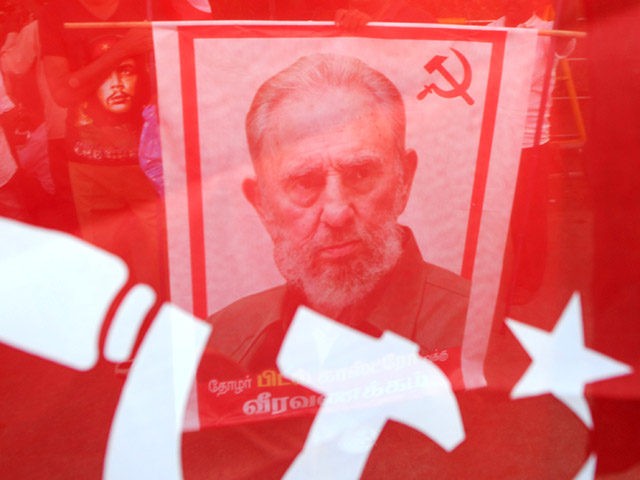ATLANTA — Georgia Senate Democrat candidate Rev. Raphael Warnock said two days after Fidel Castro died in 2016 the Cuban Communist dictator had a “complex” legacy.
Sen. Kelly Loeffler (R-GA) criticized Warnock during a debate on Sunday for working as an assistant pastor at Abyssinian Baptist Church in New York in 1995 when Castro gave a speech there.
Castro was hosted after an appearance at the United Nations and received a warm welcome at the gathering, including “rhythmic chants” of “Fidel! Fidel! Fidel!”
During a debate between Loeffler and Warnock on Sunday, Warnock denied ever meeting the Cuban dictator.
“I’ve never met him. I didn’t invite him. He has nothing to do with me,” Warnock said.
While Warnock may not have met Castro during the Communist leader’s visit to his church in 1995, he did admit that Castro did have a “complex” legacy.
Warnock delivered these remarks two days after Castro died on November 25, 2016, “We pray for the people of Cuba in this moment. We remember Fidel Castro, whose legacy is complex. Don’t let anyone tell you a simple story; life usually isn’t very simple. His legacy is complex, kind of like America’s legacy is complex.”
In comparison to Warnock, Loeffler called Castro a “murderous dictator” during the Georgia Senate debate.
Castro’s reign led to the deaths of tens of thousands of Cubans, according to some estimates.
University of Hawaii historian R.J. Rummell reported in 1987 the death toll under Castro rose to between 35,000 and 141,000, with a median of 73,000.
The Cuba Archive, an organization that has documented human rights abuses in Cuba, believes that the figure could be closer to 7,193.
Maria Werlau, the Cuba Archive’s president, said in 2016, “Those are the ones we’ve documented, using either information released by the government or the testimony of eyewitnesses, not hearsay or guesswork. We know the numbers are much, much higher, but this is what we can actually document so far.”
The chaos created by Castro also led to millions of refugees and tens of thousands of political prisoners.
“I can tell you that 2 million Cubans live outside Cuba, I can tell you that in the last 10 years, there have been nearly 18,000 political detainees,” Carlos Ponce, the director of the Latin American and Caribbean division of the Freedom House, said in 2016.
During Warnock’s 2016 sermon, he also compared the alleged similarities between the United States and Castro’s rule over Cuba, claiming that America also has its own “political prisoners.”
He said:
While we focus on political prisoners in Cuba, you saw the folks standing here this morning. If some people get slapped on the hand for the same crime and others go to federal prison, then we too have our own political prisoners, because politics more than the crime – politics of race and class, and in that sense many of us have sisters and brothers who are political prisoners.
Warnock’s attempt to find nuance about Castro’s legacy also raises questions about his own thoughts on Marxism and socialism.
During the debate between Loeffler and Warnock, Warnock would not respond to a question about whether he rejects socialism and Marxism.
In Warnock’s 2014 book, The Divided Mind of the Black Church: Theology, Piety, and Public Witness, Warnock praised Marxism as a way to “teach the black church.”
Sean Moran is a congressional reporter for Breitbart News. Follow him on Twitter @SeanMoran3.

COMMENTS
Please let us know if you're having issues with commenting.